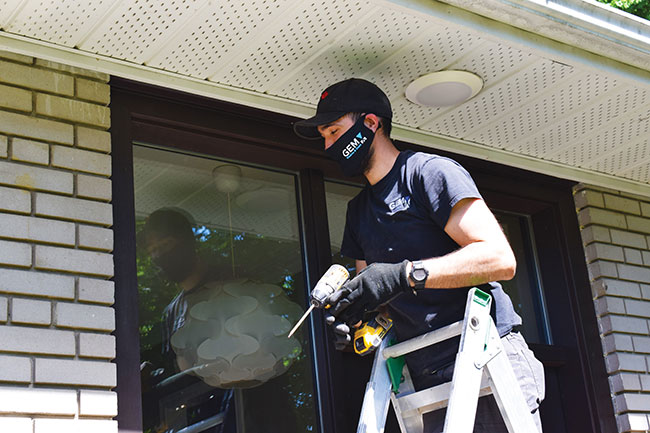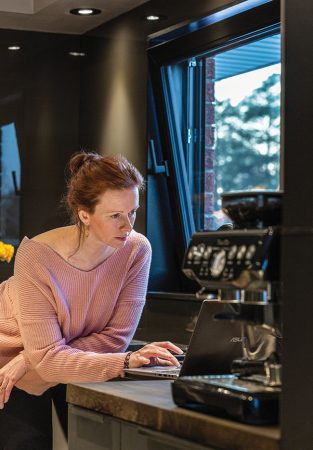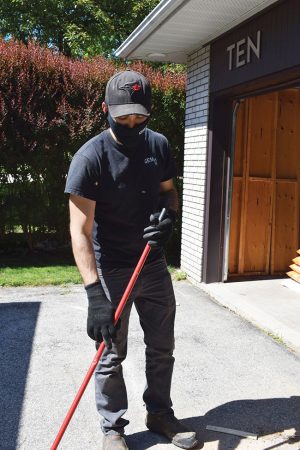
Articles
Community
What we did in the pandemic
Industry experts discuss challenges and strategies.
August 4, 2020 By Andrew Snook
 All Gem Windows and Doors installers visit jobsites equipped with all the necessary PPE gear. Getting PPE that fits right was an early challenge.
All Gem Windows and Doors installers visit jobsites equipped with all the necessary PPE gear. Getting PPE that fits right was an early challenge. Never before have Canadian companies across all sectors had to face the challenges of a pandemic like they do today. Companies have been forced to lay off employees in numbers that this generation and previous generations have never experienced before.
Businesses are expected to go bankrupt at an unprecedented rate. This time in history is certainly going to go down as one of the toughest the Canadian industry has seen in its young history, and the fenestration market is not exempt from these challenges.
Operating within the pandemic, for those that have been allowed to operate, has been extremely challenging for a variety of reasons. One of the biggest issues that have come up regularly in almost every industry is major disruption within the supply chains – thanks largely to the globalization of the supply chain and the closed borders that the pandemic has created.
In the fenestration market, companies like Heritage Renovations in London, Ont., have been trying to keep ahead of any potential shortages by taking advantage of its significant warehouse footprint.
“We pulled together to expedite our orders with manufacturers and secure extra deliveries. We really pushed and leveraged our strong relationships with manufacturing to get as much product made and delivered as much as possible so that we can be self-sufficient and not reliant on future deliveries to continue our operations,” explains Shannon Ruffell, vice-president of Heritage Renovations. “We are preparing for anything and everything as an outbreak could occur with a supplier and interfere with our product pipeline. Since we have a 25,000-square-foot facility, we have the flexibility to stockpile as much product as possible in case there is a second wave.”
In addition to planning for potential supply chain disruptions, Heritage Renovations has also been focused on making sure management has clear communications with its team to make sure new safety protocols are understood and followed.
James Baker, vice-president at Heritage Renovations, says the company is working with its clients to ensure they understand and feel comfortable with the new processes, and with business partners and manufacturers to make sure the company can, “effectively coordinate, communicate and work toward the same successful result as prior to COVID-19.”
Strong crisis management was key for the Screenco Group of Companies.
“There was a lot of uncertainty. Could we work? Could my plant staff work? Could they not work?” says Jennifer Small, president and CEO of Screenco. “We were lucky that new construction was deemed an essential service.”
The company has plants in Alberta, Ontario, Quebec, and Wisconsin in the U.S., so it had to navigate each jurisdiction’s different rules and orders.
“Managing that was a bit of a challenge,” Small says. “We were able to operate everywhere except in Quebec. Quebec was shut down and we were forced to close our plants for a few weeks, and then we had to sort of petition the Quebec government to say, ‘Hey, we’ve got new construction customers in Ontario that are expecting products and you’re not letting us make their products,’ so we did get permission to reopen earlier than the Quebec government deemed construction an essential service.”
To make sure some of those customers in Ontario continued to be serviced when Quebec shut down operations across the province, the company responded by moving equipment to its active plant in Concord, Ont.
“When we had five days of notice that Quebec was getting shut down, we made the decision to bring one of our patio screen lines to Toronto, so we could continue to service some of our Ontario customers,” Small says. “So, we literally organized the movement of material and equipment in 48 hours. We got the notice on Friday night and we moved everything on Monday.”
After getting the manufacturing side of things sorted out, the company focused on immediate communication with its internal staff and teams, setting up safety guidelines and protocols, and staying on top of them.
Laura Weil of Euro Vinyl Windows and Doors says trying to decipher whether her company was considered an essential service was a big challenge. The other big hurdle is the absolute uncertainty on the timeline of the shutdown.
“We’re a dealer-based business. Once showrooms were shut down and people were going home and closing their doors, and the dealers didn’t have a showroom and couldn’t go into a home, they were definitely closed. At that point, we closed down for a few weeks and the big part was the uncertainty. How long is this going to happen? Can we weather it? What kind of resources are going to be available?” Weil says.
The company ended up shutting down in mid-March then re-opening in early April with a scaling down of the number of people at the shop.
“But as we started to get busy again, and we were seeing more orders coming through, getting everybody back has been a challenge,” Weil says. “A lot of people that work in our shop live with large families – younger kids, older parents – and they just don’t want to put people at risk. We’ve given some incentives. We’ve given gift cards, we’ve got people to carpool. We’re trying to make it as comfortable and convenient to get people in as safely as we can.”
Gem Windows and Doors in Etobicoke, Ont. was never completely shut down from operating and didn’t want to lay off its staff, so management looked for ways to keep everyone busy.
“We kept 90 percent of our staff through this, and it wasn’t forced. We did what we could to keep our employees safe and employed by choice,” says Vito Ferrone from Gem Windows and Doors. “We found that all of our employees were happy to continue working. One of the things we decided to do to keep them working was that we renovated and updated our showroom. We made good use of the time we had. We did a lot of research on new products, local products. We also upgraded our knowledge and skillset during this pandemic to come back stronger to provide better solutions and better offerings to our customers.”
Protecting staff and clients
The protection of employees is obviously a top priority for the majority of companies across the country. Businesses have had to be extremely agile to adapt to constantly changing regulations related to occupational health and safety requirements.
Heritage Renovations went to great lengths to ensure the protection of its staff and clients.
“We are practicing social distancing and employees that can work from home are doing so without coming into the facility,” Ruffell says.
“We have staggered interactions between our administrative and operational resources, as well as modified our high frequency delivery schedules, to ensure we are limiting person to person contact as much as possible,” Baker adds.
Heritage Renovations employees are all wearing personal protective equipment in client-facing positions, when receiving deliveries, or when in-house staff interact with out-of-house staff.
“We will continue to do this until it is safe to return to regular practices,” says Baker. “At our installation sites we limit one team member to the inside of the home, and the point of contact for the customer during installation.”
Heritage Renovations’ showroom is by appointment only with only one person permitted inside at a time with employees wearing masks and gloves.
“We continue to act with an abundance of caution to ensure that social distancing is maintained and extra cleaning and PPE protocols are in place,” Baker says. “We continue to navigate the optimal way to best serve our clients while maximizing the health and safety aspects of our operations.”
The company has also adopted a new system for handling paperwork that is nearly paperless.
“We are doing electronic sign-offs and e-transfers as much as possible,” Ruffell says. “This is something we intend to continue after the pandemic.”
Gem Windows and Doors had existing installations on the books, as well as emergency replacements that came in. So, the company made sure that all of its installers came equipped to a jobsite with all the necessary PPE gear.
“It’s becoming a little bit more difficult, but we are operating,” Ferrone says. “Our installation and service department employees have been given kits and strict instructions in writing. They’re reminded every time they leave our premises to go onto a job, about social distancing, wearing masks and wearing gloves. We advise our clients that they have hand sanitizer, sanitation wipes –they are all there in the kits that each of them has. Our clients are very appreciative because once the installation is complete, our employees wipe everything down with sanitizer cloths. When they leave the customer’s home, everything has been sanitized as if it just came off the assembly line.”
Association assistance
Fenestration Canada has been very active since the World Health Organization (WHO) declared COVID-19 a global pandemic.
“The first thing we did was make sure awareness was really high. We invested in seminars and webinars. A bit of education to make sure everyone was following the social distancing rules. Then after that we decided to provide services,” says Stéphane Labelle, executive director at Fenestration Canada.
With news of the virus flooding websites and televisions with information (and disinformation) related to COVID-19, Fenestration Canada decided to take up the role of filter for its members.
“There were tons of websites, news stations telling you what to do, what not to do, so we created a COVID-19 hub where we gathered every piece of news we could find that was relevant,” Labelle says, adding that the hub drew several thousand visitors a day.
In addition to creating the news hub, the association actively pursued additional information from the various levels of government across the country.
“We also participated in a lot of discussions with different levels of government,” Labelle says, adding it was necessary since the rules for businesses changed from province to province. “Ontario had shut down, while other provinces didn’t shut everything down.”
During this time, Fenestration Canada put together a guide offering best practices for working in a pandemic.
“We just used the pandemic to provide more education, so every day there was new content, mostly about the technical side of the industry,” Labelle says.
The association also cancelled its annual spring conference this year and moved it to an online conference for a full week.
“I was really surprised because we had more or similar attendance than at an in-person one, so that’s pretty good,” Labelle says. “We would have preferred to see everyone in person, but that’s the next best thing.”
Lessons learned
Without a doubt, most companies that make it through the pandemic will be much wiser when the next emergency comes around. But what have members of the fenestration industry learned?
“The experience has truly highlighted how dedicated our team is,” Ruffell says. “Our strategy was to make the business as strong as possible coming out of this and create the best possible situation for our employees and clients. We demonstrated a flexible approach and we were quick to react to the ever-evolving situation. Our aggressiveness throughout the pandemic resulted in the need to hire several additional team members to support our clients. We have learned that anything is possible and that the ability to strategize and act quickly is a key factor in success in any crisis.”
“In these quickly changing times business and leadership have to be ready, willing, and able to act not only quickly but effectively to ensure success,” Baker adds. “We at Heritage Renovations are prepared and focused on the current challenges, but also navigating the road ahead to ensure we can properly satisfy the needs of our team, our clients, and our community.”
A helping hand… sanitizer
When the pandemic first hit Canada, one of the biggest supply chain disruptions felt throughout all industries was related to getting proper PPE, hand sanitizer and other sanitation products. Many frontline workers were left with an increased risk of contracting COVID-19 due to shortages of PPE, but some companies responded by stepping up and producing their own versions of these much-needed products. One of those companies was Adfast in Montreal.
The company, which specializes in assembly, sealing, insulation and protection solutions, began producing its own hand sanitizer line – AdClean Sprayable Disinfectant – to help address shortages across the country and restore the market to fairer and lower prices.
The company has helped eliminate the shortage of hydroalcoholic disinfectants in Canada with its production of 32,000 litres per day. The sanitizer is a medical-grade disinfectant created according to World Health Organization recommendations and Health Canada specifications.
To turn this idea into a reality, the company had to modify some of its mixers, but the bigger challenge was the timeline for certain orders.
“In April, we needed to sell 104,000 bottles to hospitals,” says Yves Dandurand, CEO of Adfast. “Everything was easy to do, but the time frame was the difficult part. Because we basically did something in a month and a half that would normally take two to three months. We needed to be creative, we needed to put more people in place, but we succeeded.”
Adfast also got involved in the production of face shields – AdShield protective face shields. These products were more difficult to produce due to raw material shortages.
“Every component being used to do a face shield was in a shortage, so we had to manufacture everything,” Dandurand says, adding that he was blown away by the energy and commitment of his employees to help do their part to battle the pandemic and help protect frontline workers. “The extent that people are willing to give themselves to fight the cause was amazing… when a group of people start to work together and believe in a cause, incredible things happen.”
Print this page


Leave a Reply